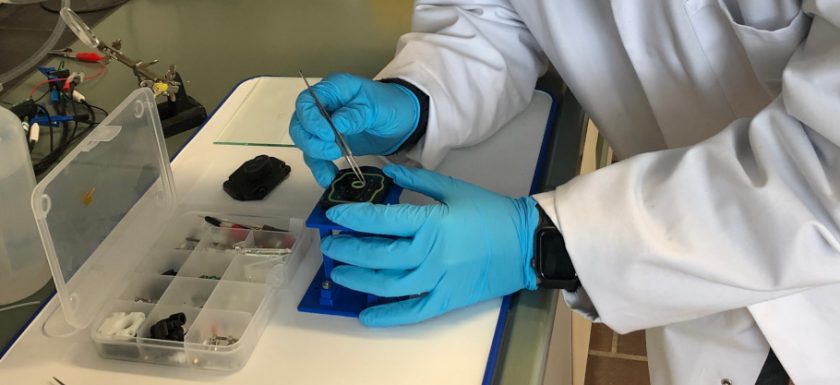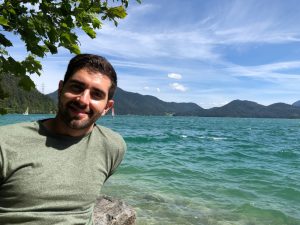
Javier Villalobos studied chemistry in San José, Costa Rica. In his PhD project, he studies catalysts for the oxygen evolution reaction by electrolytic water splitting. He is working on cobalt and manganese oxides as catalysts for oxygen evolution in electrolytic water splitting and analysing these catalysts at BESSY II. And he makes a point in using time wisely.
What motivates you for your research?
Growing up in Costa Rica, energy has always been a big issue. I remember they spoke about it on television and my parents as well talked so often about saving energy, saving water and living in a more environmentally friendly way. Today, Costa Rica is one of the few countries in the world that meets 99 percent of its energy needs with renewable energy. Working on catalysts for energy storage is perfect for me as an electrochemist who wants to contribute to the energy field.
How did you decide to do your PhD in Berlin?
Berlin is a hot spot for renewable energy and for catalysis research. During my master studies, I did an internship in a research lab at Freie Universität Berlin. There I heard a lot about? a young scientist who was in the process of building his own team. I contacted him and applied for a PhD position. And fortunately, I got it.
Was the beginning difficult?

For a student from a non-European country, the bureaucracy is quite a challenge at the beginning. I had to go to the Foreigners’ Registration Office and to the Citizens’ Registration Office, additionally I also needed a bank account – and they all required different documents, which sometimes could not be obtained immediately. HZB helped with the immigration office, and my supervisor was also helpful. When I started at HZB, the lab was already equipped with basic equipment, so I could do the first experiments straight away. Just a few weeks later, I was invited to a conference where I presented a poster with my first results and received a poster prize!
What new techniques did you have to learn?
Planning and leading experiments at the BESSY II synchrotron, that was new to me. I had to learn how to use these complex X-ray absorption spectroscopy instruments to track chemical reactions and observe, for example, degradation at the catalyst during water splitting in real time. At first, this was a little overwhelming.
Did you already improve some skills during the PhD?
 I definitely learnt a lot already. For example, when I read a scientific paper now, I do it with a more curious mind, asking all the time: how is this done? Are these results properly analysed? Is this a supported conclusion? By doing research and writing papers myself, I am reading from a different point of view. I’ve also become more confident about my time management.
I definitely learnt a lot already. For example, when I read a scientific paper now, I do it with a more curious mind, asking all the time: how is this done? Are these results properly analysed? Is this a supported conclusion? By doing research and writing papers myself, I am reading from a different point of view. I’ve also become more confident about my time management.
How do you relax during the lockdown?
I’ve rediscovered reading – I enjoy reading novels, fantasy and science fiction. I also continue taking a German course, since learning German is also one of my goals.
And if I may add a comment: the slowdown during the pandemic also forces me to be even more thorough. Now, I have to plan my experiments even more carefully, read more beforehand to prepare myself, and I have the chance to spend more time afterwards analysing the data. Slowing down a bit has opened up new possibilities, which can actually be more efficient in terms of time and saving resources. Although, I also miss having a coffee with colleagues while discussing science.
Thank you very much for this interview!
Did you like this interview? You may enjoy also reading other interviews in the series #phdlife: science.hzbblog.de/tag/phdlife
